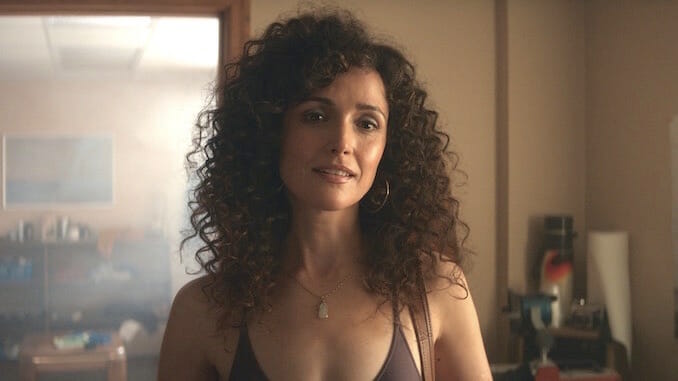Why the Excellent Physical, and Rose Byrne’s Antihero, Are Destined to Be Misunderstood
Photo Courtesy of Apple TV+
It’s easy, on first glance, to see Apple TV+’s new show Physical as an uplifting story: A talented, beautiful woman is kept in metaphorical chains in 1980s America through a combination of societal norms and her own fear, spending her days trying to massage the ego of her buffoon husband while raising a daughter essentially on her own—until she discovers aerobics through an unlikely pair of beach bums, and through her newfound strength she forges a new path for herself full of empowerment and redemption and the kind of success that comes to her inevitably once she lets her powerful inner light shine. Along the way, she escapes the demons of an eating disorder and low self-esteem while lifting up those around her, including her husband, whose doofishness gives way to real appreciation for his wife, and then to the kind of love that, finally, contains real depth.
That’s on first glance. And it’s still easy to see the show that way on second glance, and third glance, and fourth glance. In fact, it’s been so ingrained in us to expect this kind of narrative journey that it’s very difficult to shake it at all. To be fair, these elements are very real in Physical; Sheila Rubin, played by Rose Byrne in a performance that is so strong I’m almost afraid to attempt to describe it, is a woman of extraordinary charisma and talent who has seen her life squandered in a man’s world. She is going to break out of these bonds, and that emancipation provides the rhythm of the show. It’s a big part of the reason why somebody—I’m not saying me, but somebody—might start this show at around 10 p.m. one night, burn through the first three episodes on Apple TV+, pray to god the screener site for critics has all 10, and then burn through those, finishing the tenth and final episode at 4 a.m. cursing himself for sabotaging his next morning. These are all real elements of the story.
Where Physical veers, though, is in the slow realization of an uneasy truth: Sheila Rubin is not a good person. Sheila Rubin is, actually, a monster. She’s an antihero, and the incredible act of courage by creator Annie Weisman and her writers—the indispensable quality that makes this show brilliant—is that they hold back this revelation, this monstrousness, until you’re fully spun up in the web, and then they hit you with a sledgehammer, mercilessly and repeatedly, long after the point when you have the wherewithal to fight back or look away.
If that sounds confrontational or unpleasant, it’s not. Or, not too confrontational, too unpleasant. And it’s not personal. Sheila, who is revealed as a cutthroat businesswoman and visionary as much as she is a talented dancer, is herself a victim. She’s the victim of loathsome parents who loaded her with body image issues and much worse, and friends who recognized her plight but instead of helping cursed her with the knowledge of how to binge and purge.
It’s the kind of background that would have broken a lesser person, and the cruel irony for Sheila is that when she finally summons the courage to blossom, she instinctively seeks out the systems that have trapped her in the first place. Fame, money, adoration; for these, she does not uplift her new friends, does not see the sincerity in her husband’s love. She fails to return deep acts of friendship at the critical hour, and dismisses her husband as an incurable loser. And in the climactic scene, which I’ll take pains not to spoil, there is not even the possibility of redemptive intimacy—she can only engage from a distance with another damaged soul, worshiping together at the altar of something that warps humanity and precludes the warmth of contact.